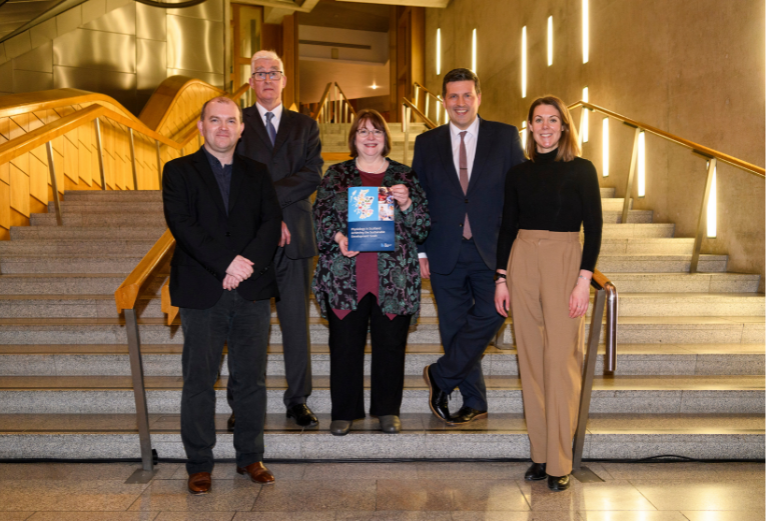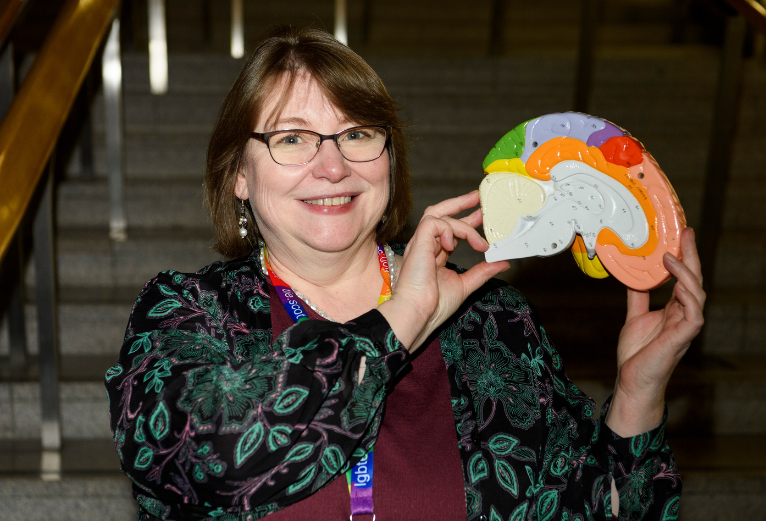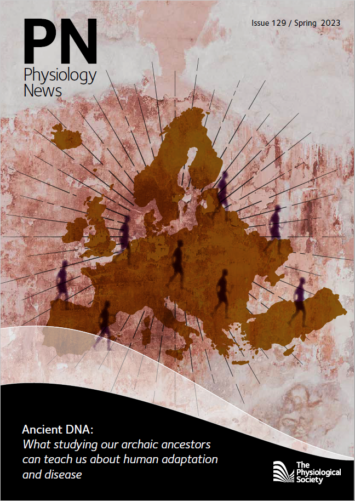
Physiology News Magazine
Celebrating the contribution of Scotland’s research base to meeting the Sustainable Development Goals (SDGs)
Policy Focus
News and Views
Celebrating the contribution of Scotland’s research base to meeting the Sustainable Development Goals (SDGs)
Policy Focus
News and Views
Tom Addison
Policy Manager, The Physiological Society
Scotland’s research to meet the Sustainable Development Goals
Following the publication of Scotland’s REF 2021 results and the Scottish Funding Council (SFC)’s Scotland’s research contribution to national and international challenges, The Physiological Society partnered with the Royal Society of Edinburgh to showcase some of the research being undertaken in Scotland to elected officials in the Scottish Parliament that responds to the ambitions of the United Nation’s Sustainable Development Goals (SDGs). The event was an opportunity to continue to “bang the drum” for physiology in another of the UK’s four national legislative bodies while aligning with Scotland’s national funding and policy priorities relevant to the work of our members.
Agreed in 2015, the 2030 Agenda for Sustainable Development includes 17 SDGs. Building on the principle of “leaving no one behind”, the SDGs emphasise a holistic approach to achieving sustainable development for all. They combine a number of initiatives targeting the end of poverty and other socio-economic inequalities with objectives relating to improving health and education, while tackling climate change and working to preserve the planet’s oceans, agriculture, wildlife and forests.
Each SDG has a series of targets totalling 169 individual targets overall. Many of these goals have a direct health target, which will be informed by physiological research. For example, SDG 11 (Sustainable Cities and Communities) includes targets related to reducing deaths caused by flooding and improving transport systems. Additionally, SDG 3 “ensure[s] healthy lives and promote[s] well-being for all at all ages”, a focus which clearly aligns with physiological research. Over the last decade, a third of Scotland’s research was directly related to the ambitions set out in the SDGs. Scotland is world-leading in the physiological sciences, with a proud history of Nobel Prize winners continued today by cutting-edge research and teaching.

The SFC’s response to the SDGs
Scotland’s research contribution to national and international challenges was published by the SFC in March 2022 and outlines how the funding provided by the SFC will address Scotland’s ambitions in relation to the SDGs. The foreword notes that “The SDGs underpin the Scottish Government’s National Performance Framework (NPF) and its ambition for a sustainable, just and prosperous future for everyone.” The report also highlights that almost half of all Scottish SDG-related research contributed to an improved understanding of good health and wellbeing and this research aligns with the targets identified in SDG 3.
Given the strength of Scottish research related to the SDGs and the overwhelming focus on this research output on health and reducing health inequalities, the event was an important opportunity to recognise physiology’s role within this and encourage the Scottish Government to continue to support physiological research that builds on the impact of previous research in these fruitful areas.
As The Society launches its own updated strategy, The Society’s policy team will be working closely on collaborations such as these to ensure that we play an influential role in shaping funding and public policy and continue to advocate for physiology’s role in meeting often complex and deep-rooted problems such as health inequalities and healthy ageing.
To this end, we produced a short report for the event Physiology in Scotland: Achieving the Sustainable Development Goals, which characterises the role of physiological research in addressing the SDGs and also gives some tangible examples from across Scotland’s higher education institutions (HEIs). One such example was from the University of Aberdeen, which highlighted researchers’ work there in developing a low cost COVID-19 vaccine, which could be rolled out globally.

Scotland at the Heart of Meeting Global Challenges
The event in Holyrood, kindly hosted by Clare Adamson MSP, brought together Scottish researchers, Members of the Scottish Parliament (MSPs) and policymakers from throughout the country, to celebrate the contribution that Scotland’s HEIs have made to meeting the SDGs and outline the major challenges and opportunities yet to be addressed. We also heard from Jamie Hepburn MSP, the Minister for Higher Education and Further Education, Youth Employment and Training, as well as Dr Cat Ball from the SFC, Professor Derek Scott from the University of Aberdeen representing The Society and Professor Charlie Withers from the University of Edinburgh. In combination, their speeches demonstrate the breadth of impact that Scottish research has in meeting the SDGs. We would like to thank Catherine Ross for her valuable contribution and support for this project and its related report.
The event also included an exhibition from some of Scotland’s HEIs and those physiologists who contributed to our report for the event. Some examples of impact of the event have already been shared by members of The Society and MSPs. The University of Glasgow project “Science Travels”, which promotes STEM among members of the Gypsy, Roma, Traveller, Showmen and Boater (GTRSB) communities was referenced in the Scottish Parliament debate on International Women and Girls in Science Day 2023. Similarly, the Scottish Parliament Motion “S6M-07768: Scotland at the Heart of Meeting Global Challenges”, has been signed by 21 MSPs on a cross-party basis. Additionally, our event host met with representatives from the University of Edinburgh neuroscience team about research into chronic pain. The Society’s policy team will be following up these and other connections to continue to promote Scottish physiology research among politicians and funders alike.
The Society will be working closely with Scottish members and other physiologists to ensure that funding available exclusively to Scottish members can be secured to ensure that physiology continues to make an impact both within Scotland and through international collaboration.
The foreword of the report, co-authored by Professor Derek Scott and Catherine Ross, Scotland’s Chief Health Science Officer, notes that “The SDGs underpin the Scottish Government’s National Performance Framework (NPF) and its ambition for a sustainable, just and prosperous future for everyone.”
Read the report at physoc.org/policy/research-landscape-and-funding/scotland-at-the-heart-of-meeting-global-challenges/
